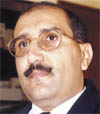Nabeel Hameem: “The post office commands an increasingly central place in our lives and businesses.” [Archives:1998/16/Interview]
An increasing number of Yemenis and expatriates are using the services provided by the public post offices and the private companies dealing with this business. Problems are bound to arise. Some people complain their letters are getting lost and others want to see swifter services provided. Still, a minority of people do not trust the post office altogether; they would rather rely on relatives and friends to hand-deliver their letters and parcels for them.
The postal service has also been increasingly involved in financial transactions, transfers, and savings.
To learn more about this very important service, Dr. Salah Haddash, Yemen Times Managing Editor, met Mr. Nabeel Hameem, who has been the chief of the Old University Post Office in Sanaa for the last six years. He filed the following interview and compiled the necessary data to show the efficiency of the Yemeni postal services.
Q: Could you give us an idea about the services provided by your office?
A: There are the usual postal services such as sending and receiving letters, savings accounts, remittances, the express post, payment of pensions and the receiving and transmitting of fax messages.
Q: What are the major problems you face in doing your work?
A: The main problem we face is the ignorance of some people of the nature of the postal service. They do not know how to write a full address, thinking that by just writing the name of the addressee and his home town, the letter will get there.
Q: How can this situation be rectified?
A: The post-office administration should conduct a comprehensive media campaign to raise public awareness of the best possible way to efficiently use postal services. Only educated people currently deal with the post office, while, illiterate people just don not know how.
Q: Do the users of post-office boxes face any problems?
A: There are no problems to speak of in this regard. A few post-office box subscribers are not honest enough to hand back other people’s letters when they are mistakenly placed in their boxes.
Q: How is sending a money remittance done?
A: Sending money remittances is presently confined to within Yemen. Foreign remittances will be introduced in the future. A total fee of YR 70 is levied on each remittance sent. It consists of a 2% tax on each YR 1,000 sent and YR 55. Only 1% is levied on remittances of more than YR 20,000.
Q: How swift is the express mail? And how large is its cost?
A: Although it costs more, the express mail is faster than the ordinary service. It takes two days for a letter sent by the express mail to reach its destination within Yemen, as opposed to 3 or 4 days by ordinary mail. In some remote regions, mail deliveries take place once or twice a week only. It costs YR 250 to send a letter locally by express mail and only YR 20 by the ordinary mail. The difference is more marked when it comes to sending mail abroad – YR 1,250 by express mail to an Arab country, for example, compared to only YR 50 by ordinary mail. So only those people who need to send something urgent use the express mail service.
Post is delivered to Taiz and Hodeida by land and air; while, to Hadhramaut and Mukallah, for instance, by air only.
Q: What about the fax service?
A: We provide regular fax service, within Yemen and abroad. To send a single sheet of paper by fax, it costs YR 35 within Yemen, YR 320 to Arab countries, and YR 400 to the rest of the world.
Q: The monthly pensions are paid to retired people through the post office. How organized is this process?
A: The post office facilitates the payment of pensions to retired people, the handicapped, the families of dead civil servants and army martyrs. In the past pensioners had to receive their money from particular post offices. Nowadays, a new system has been introduced.
With the issuance of special coupons, a pensioner can now receive his or her money from any post office in the country. These coupons have been introduced in about 8 governorates so far, more areas will follow suit soon.
Q: What sort of problems arise in dealing with old-age pensioners?
A: We have to be very careful while dealing with these old people. Some of them resort to using bad language or brandishing their weapons when the payment of their pensions is delayed. It is not because they are aggressive or hostile, but because their old age makes them grumpy and impatient. Also, they are not used to obeying a particular order or system such as standing in a queue or being served according to their numbers, etc.
Q: Could you briefly tell us about the saving accounts that can be opened at the post office?
A: This is a free service, and the account books issued by the post office can be used anywhere in the country. The annual interest rate varies between 1% to 2%.
The minimum amount of money required to open a saving account at the post office is YR 130. You open such an account in your name or in the name of your child to encourage him or her to save some his/her daily allowance. A child, of course, can only deposit money in such an account, but cannot withdraw if he or she is under 18 years old.
Q: What difficulties do you face in your work, in general?
A: The major problem is lack of incentives. Our salaries are rather small. I myself, for example, work from 8 am to 1.30 pm and from 3 pm to 7.30 pm everyday, and only get YR 9,000 a month.
Post-office employees are also not given enough chance to train and develop their skills.
Some of us enter different courses, paying from our private resources. Post-office workers need to learn English so that they are able to better deal with foreigners and need to learn computer skills.
Q: Any last word?
A: I hope that there will better cooperation and coordination between the post office and the media to raise public awareness of how to benefit from the services provided by this very important establishment.
There should alo be more training courses for post office employees so that they perform their duties as best as can be.
——
[archive-e:16-v:1998-y:1998-d:1998-04-20-p:./1998/iss16/intrview.htm]


